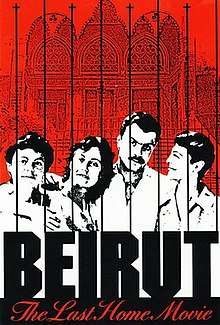Beirut: The Last Home Movie
Beirut: The Last Home Movie is a 1987 documentary film directed by Jennifer Fox. It follows the life of Gaby Bustros and her family, who live in a 200-year-old mansion in Beirut during the Lebanese Civil War. The Bustros family, one of the noble families of Beirut, remain in their ancestral home despite the endless war that surrounds them.[1]
| Beirut: The Last Home Movie | |
|---|---|
 Film poster | |
| Directed by | Jennifer Fox |
| Written by | Jennifer Fox John Mullen |
| Music by | Lanny Meyers Ziad Rahbani |
| Cinematography | Alex Nepomniaschy |
| Edited by | John Mullen |
Release date |
|
Running time | 123 minutes |
| Country | United States |
| Language | English |
Exhibition
The film was screened at the Berlin Film Festival, the London Film Festival, and at INPUT, the International Television Conference. It was broadcast on US television as a Frontline special on PBS in 1991.[2] The film was awarded the Excellence In Cinematography Award and won the Grand Jury Prize Documentary at the 1988 Sundance Film Festival.[3]
Awards
- Sundance Film Festival Best Cinematography[3]
- Soc. Civile des Aut. - Multimedia Best Screenplay
- Women and Cinema Argentina - Press Award
- C.I.N.E. - Golden Eagle Award
- San Francisco Film Festival - Golden Gate Award
- Cinema du Reel - Grand Prix
gollark: Quantum computers are not safe, since they can be simulated on our nonquantum computers.
gollark: (Ternary computers are not safe, since base conversion is trivial)
gollark: Guess what your code consists of, programmers?!
gollark: We copyrighted 1 and 0.
gollark: Yes, it's GTech™️'s code.
References
- "Archived copy" (PDF). Archived from the original (PDF) on 2006-11-11. Retrieved 2007-02-23.CS1 maint: archived copy as title (link)
- "Archived copy". Archived from the original on 2011-07-24. Retrieved 2011-10-23.CS1 maint: archived copy as title (link)
- http://history.sundance.org/films/953
External links
| Preceded by Sherman's March |
Sundance Grand Jury Prize: Documentary 1988 |
Succeeded by For All Mankind |
This article is issued from Wikipedia. The text is licensed under Creative Commons - Attribution - Sharealike. Additional terms may apply for the media files.